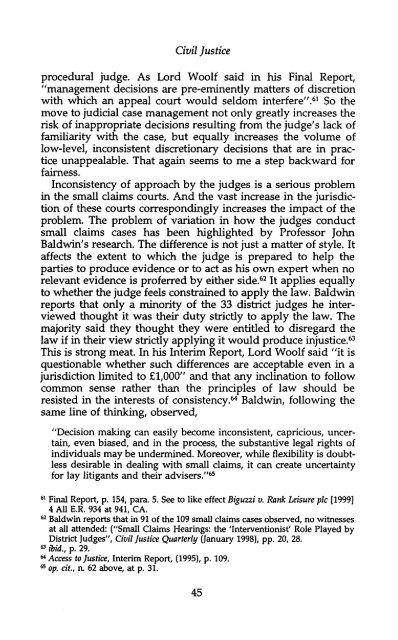HAMLYN - College of Social Sciences and International Studies ...
HAMLYN - College of Social Sciences and International Studies ...
HAMLYN - College of Social Sciences and International Studies ...
Create successful ePaper yourself
Turn your PDF publications into a flip-book with our unique Google optimized e-Paper software.
Civil Justice<br />
procedural judge. As Lord Woolf said in his Final Report,<br />
"management decisions are pre-eminently matters <strong>of</strong> discretion<br />
with which an appeal court would seldom interfere". 61 So the<br />
move to judicial case management not only greatly increases the<br />
risk <strong>of</strong> inappropriate decisions resulting from the judge's lack <strong>of</strong><br />
familiarity with the case, but equally increases the volume <strong>of</strong><br />
low-level, inconsistent discretionary decisions that are in practice<br />
unappealable. That again seems to me a step backward for<br />
fairness.<br />
Inconsistency <strong>of</strong> approach by the judges is a serious problem<br />
in the small claims courts. And the vast increase in the jurisdiction<br />
<strong>of</strong> these courts correspondingly increases the impact <strong>of</strong> the<br />
problem. The problem <strong>of</strong> variation in how the judges conduct<br />
small claims cases has been highlighted by Pr<strong>of</strong>essor John<br />
Baldwin's research. The difference is not just a matter <strong>of</strong> style. It<br />
affects the extent to which the judge is prepared to help the<br />
parties to produce evidence or to act as his own expert when no<br />
relevant evidence is preferred by either side. 62 It applies equally<br />
to whether the judge feels constrained to apply the law. Baldwin<br />
reports that only a minority <strong>of</strong> the 33 district judges he interviewed<br />
thought it was their duty strictly to apply the law. The<br />
majority said they thought they were entitled to disregard the<br />
law if in their view strictly applying it would produce injustice. 63<br />
This is strong meat. In his Interim Report, Lord Woolf said "it is<br />
questionable whether such differences are acceptable even in a<br />
jurisdiction limited to £1,000" <strong>and</strong> that any inclination to follow<br />
common sense rather than the principles <strong>of</strong> law should be<br />
resisted in the interests <strong>of</strong> consistency. 64 Baldwin, following the<br />
same line <strong>of</strong> thinking, observed,<br />
"Decision making can easily become inconsistent, capricious, uncertain,<br />
even biased, <strong>and</strong> in the process, the substantive legal rights <strong>of</strong><br />
individuals may be undermined. Moreover, while flexibility is doubtless<br />
desirable in dealing with small claims, it can create uncertainty<br />
for lay litigants <strong>and</strong> their advisers." 65<br />
61 Final Report, p. 154, para. 5. See to like effect Biguzzi v. Rank Leisure pic [1999]<br />
4 All E.R. 934 at 941, CA.<br />
62 Baldwin reports that in 91 <strong>of</strong> the 109 small claims cases observed, no witnesses<br />
at all attended: ("Small Claims Hearings: the 'Interventionist 1 Role Played by<br />
District Judges", Civil Justice Quarterly (January 1998), pp. 20, 28.<br />
63 ibid., p. 29.<br />
64 Access to Justice, Interim Report, (1995), p. 109.<br />
65 op. cit, n. 62 above, at p. 31.<br />
45

















